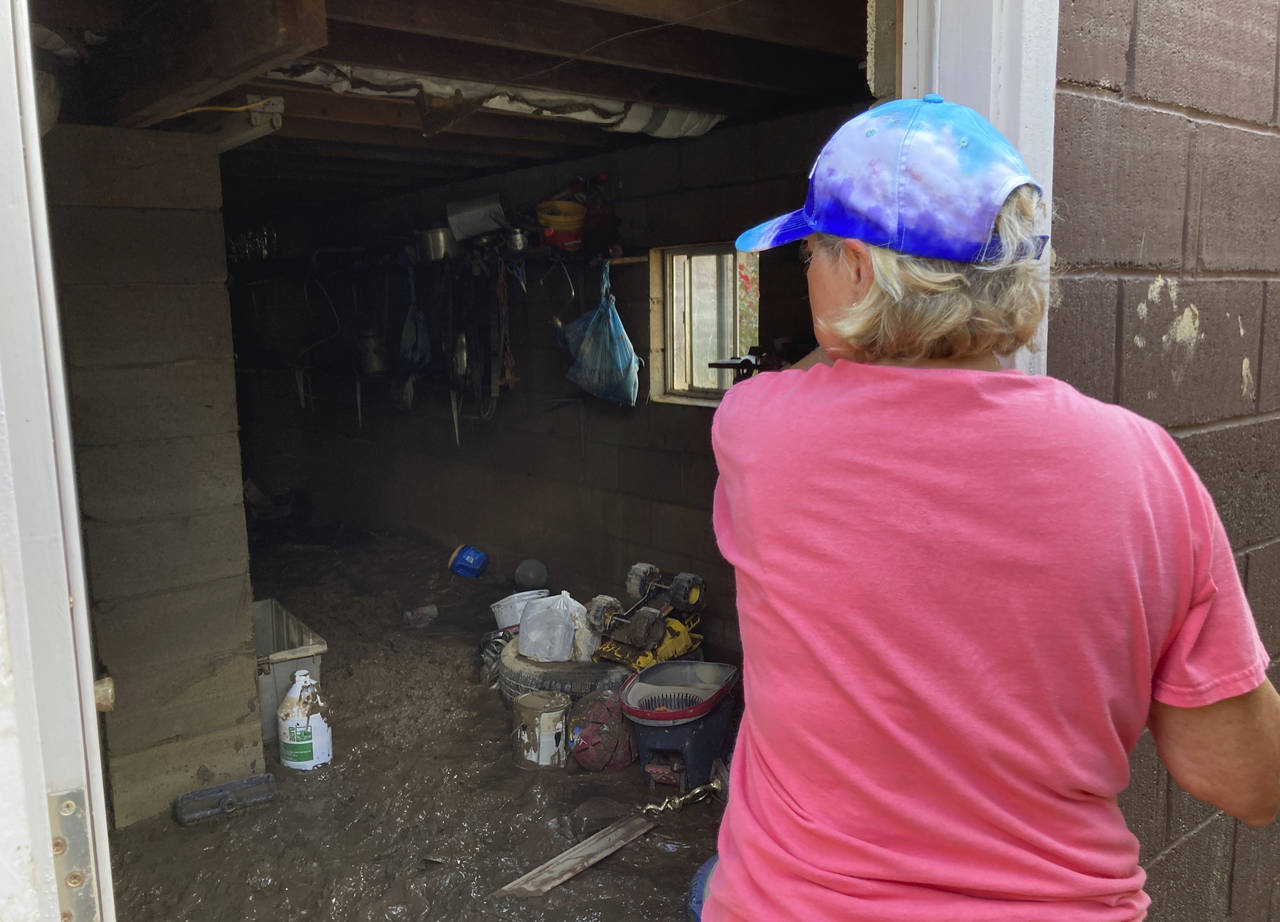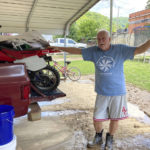Despite dangers, deep roots make Appalachia hard to leave
Aug 1, 2022, 10:06 AM | Updated: Aug 2, 2022, 9:30 am

Brenda Francis peers into the muddy basement of her home in Garrett, Ky., Saturday, July 30, 2022. Francis is tired of the area's flooding and wants to move away, to be closer to her grandchildren. The tiny town of Garrett was completely under water when floodwaters struck eastern Kentucky last week. (AP Photo/Dylan Lovan)
(AP Photo/Dylan Lovan)
GARRETT, Ky. (AP) — This tiny sliver of a town off a state highway in eastern Kentucky has been home to Brenda Francis and her husband, Paul, for decades.
Paul Francis was born 73 years ago in this house, a yellow and brown one-story, which like many dwellings in Garrett is nestled in a valley between tall, forested hills. The retired school teacher loves it here, and the couple was gifted the house by his parents about 40 years ago.
But after another flood — this one maybe the worst they’ve seen — Brenda Francis said she is done. She joins many others in this corner of Appalachia who see this latest disaster as a devastating blow to their lifestyle. Some say they’re considering moving away, despite their deep roots.
Francis, 66, said her husband wants to stay: “But not me. I don’t want to live here no more, and he knows it. So we’re going to be getting out of here.”
Kentucky’s Appalachian region has known hardship. The coal economy withered away and took the good-paying jobs with it. The opioid crisis flooded towns with millions of pain pills. Prospects were so bleak that many people left, cutting the population in many counties by double-digit percentages in the past two decades. In the Francises’ home county of Floyd, the population has declined by 15% since 2000. And household annual income in many of the counties hit hardest by last week’s flooding is a little more than half the national average of about $65,000.
But many stayed, held by ties to their communities, families and their history here. The flooding that hit the area last week is making even some of those stalwarts reconsider, especially in and around Garrett, a community of about 1,300 people that was founded by a coal company in the early 1900s.
The region’s strong social fabric and familial connections give pause to people considering moving away from home, said Ann Kingsolver, director of the Appalachian Studies Program at the University of Kentucky.
“Social capital is really important,” Kingsolver said in an email message. “Those are the resources that people have through investing in social networks of kin and neighbors over many years — a kind of wealth beyond monetary value.”
When the 2008 financial crisis hit, she said, many young people moved back to rural communities in Appalachia because they had a place to live and child care options.
Kingsolver said there is little available rental or motel space in those rural areas, but flooding victims often get help and shelter from relatives and neighbors nearby.
Pam Caudill lives on the same street as her son, who’s been a big help since the floodwaters reached 4 feet (1.2 meters) high in her home in Wayland, just a few minutes from Garrett. Her husband died of a heart attack in May, and the flooding has tested her resolve to remain in her small town.
“I have thought about it, but here’s the thing: It took everything that me and my husband could do to buy a house,” she said, weeping. “It’s hard to let go of something that you worked so hard for.”
So she and her son will instead see what can be salvaged in her home and hope the foundation remains solid.
“It was my husband’s home; it’s my children’s home,” said Caudill, who temporarily relocated to a state park shelter over the weekend. “Wayland the town has always been their home.”
Two miles outside Garrett, 104-year-old Annis Clark rode out the storm on her own as she lost electricity and her basement flooded. She and her husband built their house in the ’50s, and she’s stayed long after he died in the ’80s, said Michael Clark, her son.
“She’s a survivor. I don’t know of any other way to put it,” said Clark, who attended Garrett High School and then moved away to Lexington, where he worked in television production and operations. “I have no doubt she will stay here until she’s done.”
Clark was buying supplies for her Monday in nearby Prestonsburg. He graduated from high school in 1964, and said many of his classmates moved away like he did to seek jobs. In many parts of eastern Kentucky, he said, “unless you wanted to be a (coal) miner, your options would typically be teacher.”
In Garrett, Brenda Francis despaired at the inches of mud that had flowed into the area under their home, which was raised after a flood in the 1950s, when her husband’s parents lived there.
“When you get older, you’re not able to clean all this up. We’re just totally exhausted,” Francis said. “How are we going to get this mud out of here?”
Despite his wife’s frustrations, Paul Francis was cheerfully cleaning up the family homestead, stacking toys in a ’70s pickup truck his father bought brand new. Sloshing around in rubber boots, he smiled as he prepared to hook up a pressure washer to spray mud from his grandchildren’s toys.
Their grandchildren are one of the reasons Brenda Francis wants to move away, to higher ground in Prestonsburg, where the kids live. She said they, like many in town, have no flood insurance on their house — but they do have a possible buyer. She’s hoping the fact that the house’s living spaces stayed dry will make it a desirable property.
Her adult sons love the town of Garrett, but “they’re all grown and got their own families now. They don’t want to come back here,” she said as her husband’s pressure washer hummed in the background.
“Who would want to come?” she said. “It still floods here.”
Copyright © The Associated Press. All rights reserved. This material may not be published, broadcast, rewritten or redistributed.

























